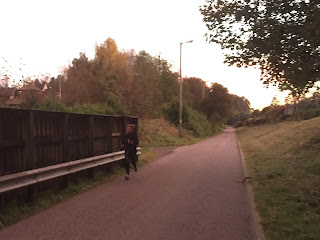Norwegian marathon queen Grete Waitz explained at several occasions that whenever she was injured or sick before a race, and thus forced to a complete rest, she performed better than ever. It was after such incidents that she set some of her most spectacular world records. Still, if she was not injured or sick, she found it impossible to take a full rest. This seems to be the case for most athletes. Although everybody knows that rest before a race is important, and there is no way to improve your form during the last two weeks, psychologically we are all afraid of losing form if we rest too much.
All books about training explain that the effect of a form-improving training comes after about two weeks. So during the last 14 days before a race, it is too late to train to get better. It is of course still good to have a few runs, even some intervals, so that the body does not "forget" the feeling of speed and endurance. However the most important thing before a race is to give the body and the legs enough rest, time to heal the small pains here and there, and a huge surplus of energy. After a hard training session, the body is broken down; it takes some days before things get repaired and the body adjusts itself to a higher level of training. This is the idea behind how hard exercise improves our form. Once the body is done with the repairing from the last exercise session and the adjusted improvement, it is ready for new exercise. If exercise does not come at that point, there come a few days of excess energy. The clue is to plan the race day to coincide exactly with the time of this excess energy.
Taper time practice should be either so light or so short that we have more energy after each exercise session than before. This way we build up energy towards the race. I have taken this literally. After a surprisingly easy 30 km last Sunday, my taper time started pretty hectic. It has been a busy week with 10 hour working days, and the planned training sessions simply did not work. On Tuesday we were supposed to have intervals, but I felt so exhausted that I simply had a super slow 11 km zone 1 session while Frank did his intervals. On Thursday, though, my body felt ready and eager, and I had a great interval session, which worked exactly by the book: more energy after the session than before. Yesterday, I was planning a shorter and lighter interval session, but it simply did not feel right. After the unusually exhausting week, I felt like resting and sleeping the whole day, and I did exactly that. Today, a run of 15-16 km is planned, the speed depending on the feeling. And then I plan my last run before the race to be on Tuesday.
I know many of my friends will be running closer to the race, but my experience with my own body is that a lot of rest helps me during a race. Last year at the Stoltzekleiven race, the four full days of complete rest before the race was exactly what helped me with a new BP. For Bergen City half marathon in 2014, I was forced to rest due to illness, and it gave me an extreme boost for the race. For Oslo half marathon in 2014, I trained too much and too close to the race, which cost me towards the end of the race. When Frank tried my advice for this year's Bergen City half marathon, he had a new PB. So, next week I will try to go home from work at normal hours, relax on the couch, eat my carbs, go to bed early, sleep as much as I can, stretch lightly, and try to convince Frank to give me a few leg massages.
The feeling that there is actually nothing more I can do is quite elevating.





Ingen kommentarer:
Legg inn en kommentar